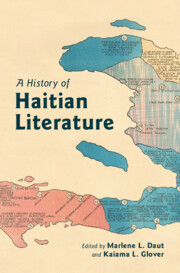Book contents
- A History of Haitian Literature
- Additional material
- A History of Haitian Literature
- Copyright page
- Contents
- Figures
- Contributors
- Chapter 1 Editors’ Introduction
- Chapter 2 Literature as Loot
- Chapter 3 Theater in Early Independent Haiti
- Chapter 4 “So all the world may know it”
- Chapter 5 Civil War, Guerre de Plume, and the Emergence of Early Haitian Periodical Culture
- Chapter 6 History, Politics, and Revolutionary Romanticism in Charles Hérard-Dumesle’s Voyage dans le nord d’Hayti (1824) and the Anonymously Published L’Haïtiade (ca. 1826)
- Chapter 7 The Cénacle and the Sacred
- Chapter 8 Émeric Bergeaud’s Stella
- Chapter 9 The Predicament of Civilization
- Chapter 10 The Politics of Disenchantment
- Chapter 11 Haitian Poetry in Creole
- Chapter 12 Some Causes of the Underdevelopment of Haiti’s Creole-Language Literature
- Chapter 13 Performing Rebellion and Re-membering Haiti’s Past and Present in Twentieth-Century and Contemporary Theater
- Chapter 14 Haitian Writers and the Forging of a National Voice through Periodicals in the Twentieth Century
- Chapter 15 “Arrêtez le monde! Je veux rêver”
- Chapter 16 Occupation-Era Literature in Haiti
- Chapter 17 Haitian Literature and the Dominican Republic
- Chapter 18 Marxism and the Moun Andeyo
- Chapter 19 Jacques Roumain, from Indigenism to Nationalism
- Chapter 20 For a History of the Novel of Haitian Tradition
- Chapter 21 Exile and Twentieth-Century Haitian Writing
- Chapter 22 The Zonbi as Episteme in Haitian Prose Fiction
- Chapter 23 Living Vodou
- Chapter 24 Papa Loko’s Dire Poétique in Twenty-First-Century Port-au-Prince-Based Haitian Poetry
- Chapter 25 Partisan Politics and Twentieth-Century Fictions of the Haitian Revolution
- Chapter 26 Haitian Women’s Fiction
- Chapter 27 Haitian Uses of the Erotic
- Chapter 28 Archiving Narratives of Maternal Loss and Queer Life in Haitian Fiction in the Wake of the 2010 Earthquake
- Index
Chapter 18 - Marxism and the Moun Andeyo
Published online by Cambridge University Press: 07 November 2024
- A History of Haitian Literature
- Additional material
- A History of Haitian Literature
- Copyright page
- Contents
- Figures
- Contributors
- Chapter 1 Editors’ Introduction
- Chapter 2 Literature as Loot
- Chapter 3 Theater in Early Independent Haiti
- Chapter 4 “So all the world may know it”
- Chapter 5 Civil War, Guerre de Plume, and the Emergence of Early Haitian Periodical Culture
- Chapter 6 History, Politics, and Revolutionary Romanticism in Charles Hérard-Dumesle’s Voyage dans le nord d’Hayti (1824) and the Anonymously Published L’Haïtiade (ca. 1826)
- Chapter 7 The Cénacle and the Sacred
- Chapter 8 Émeric Bergeaud’s Stella
- Chapter 9 The Predicament of Civilization
- Chapter 10 The Politics of Disenchantment
- Chapter 11 Haitian Poetry in Creole
- Chapter 12 Some Causes of the Underdevelopment of Haiti’s Creole-Language Literature
- Chapter 13 Performing Rebellion and Re-membering Haiti’s Past and Present in Twentieth-Century and Contemporary Theater
- Chapter 14 Haitian Writers and the Forging of a National Voice through Periodicals in the Twentieth Century
- Chapter 15 “Arrêtez le monde! Je veux rêver”
- Chapter 16 Occupation-Era Literature in Haiti
- Chapter 17 Haitian Literature and the Dominican Republic
- Chapter 18 Marxism and the Moun Andeyo
- Chapter 19 Jacques Roumain, from Indigenism to Nationalism
- Chapter 20 For a History of the Novel of Haitian Tradition
- Chapter 21 Exile and Twentieth-Century Haitian Writing
- Chapter 22 The Zonbi as Episteme in Haitian Prose Fiction
- Chapter 23 Living Vodou
- Chapter 24 Papa Loko’s Dire Poétique in Twenty-First-Century Port-au-Prince-Based Haitian Poetry
- Chapter 25 Partisan Politics and Twentieth-Century Fictions of the Haitian Revolution
- Chapter 26 Haitian Women’s Fiction
- Chapter 27 Haitian Uses of the Erotic
- Chapter 28 Archiving Narratives of Maternal Loss and Queer Life in Haitian Fiction in the Wake of the 2010 Earthquake
- Index
Summary
This chapter considers politically oriented works by Jacques Stephen Alexis, Edris Saint-Amand, Anthony Lespès, and Jacques Roumain, all communist writer-activists who came of age during the US occupation and were committed to the twinned ideologies of anti-racism and anti-imperialism. Kaussen shows how their Indigenist writings make explicit the connection between literature, Marxism, and the so-called folk, advocating for the embrace of Haiti’s African cultural origins, as expressed through the traditions of the peasantry. Not only do these writers put forward meaningful and incisive critiques of the existing social order, Kaussen observes, but they also present a wide array of imagined alternatives. Her chapter emphasizes the idiosyncrasies of Haitian socialism, noting the points of both intersection and diversion from Franco-European political models.
Keywords
- Type
- Chapter
- Information
- A History of Haitian Literature , pp. 325 - 342Publisher: Cambridge University PressPrint publication year: 2024

